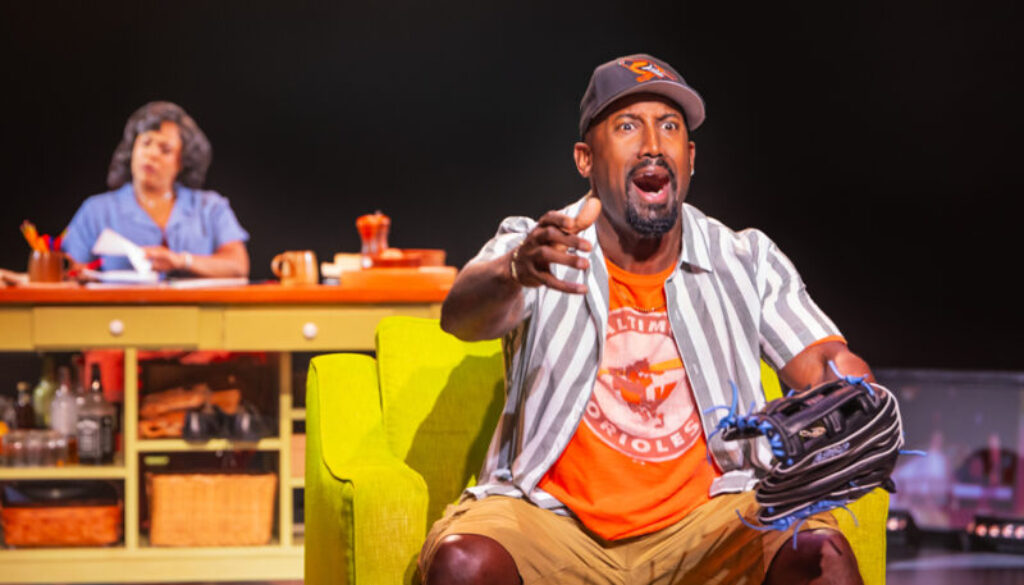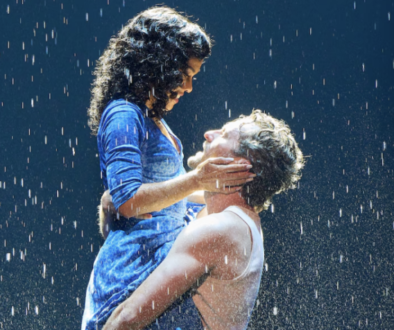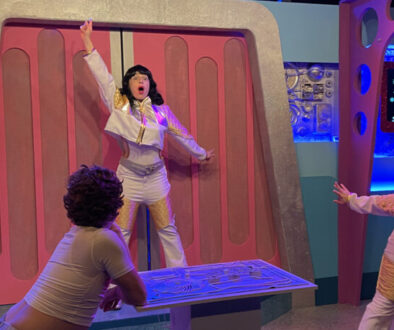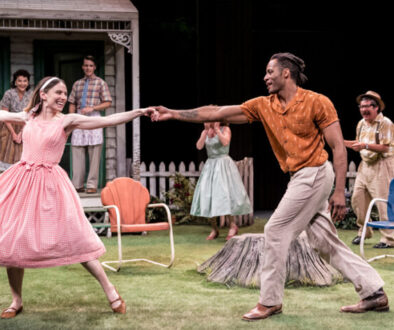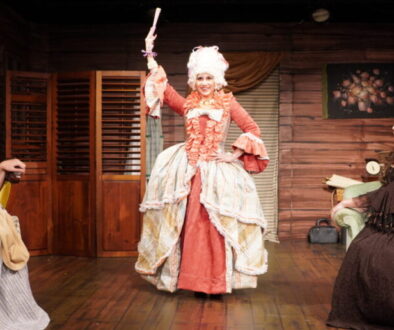‘By LOU HARRY
Instead of praising our goulash,
They’re appraising the plays of Willie Mays.
In the original production of Dawn Yankees, that’s a lyric sung by Meg Boyd and other neglected wives lamenting the lack of attention paid to them by her husbands during baseball months.
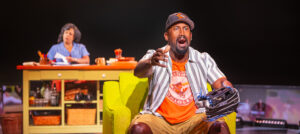
It’s just one of many lyrics and lines that audiences at Arena Stage’s revisal of Damn Yankees aren’t hearing.
Revisals of older musicals (as opposed to simple revivals) aren’t something new. With the rights-holders permission, of course, adaptations of books and lyrics happen for a variety of reasons. Sometimes, it’s an effort to make an unsuccessful piece finally work – see the multiple attempts at turning Chess and The Baker’s Wife into hits (including two revised productions this fall in NYC).
Damn Yankees certainly wasn’t one of those. The story of baseball fan, Joe, who accepts a deal with the devil to get in the game was a 1000-plus performance hit on Broadway from 1955-57 with a successful film adaptation and a mid-90s revival. With a national tour headlined – and dominated – by Jerry Lewis, plus plenty of regional productions, Damn Yankees has been a certifiable crowd pleaser across decades.
Other revisals happen in an effort to bring older works up to contemporary sensibilities. You’d be hard pressed, for instance, to find a recent production of Annie Get Your Gun that includes its original song “I’m an Indian Too.”
But Damn Yankees isn’t that either. Like How to Succeed in Business Without Really Trying, it’s not a show that needed extensive changes in order to finally work. Or to make it less cringy to a more culturally aware audience.
No, the Arena Stage adaptation – credited with a new adaptation by Will Power and Doug Wright and additional lyrics by Lynn Ahrens – is rooted less in “how can we save it” and more in “wouldn’t it be interesting if…”
And it largely succeeds, thanks to a slam-bang, joyful production in which director/choreographer Sergio Trujillo makes smart use of Arena’s intimate arena space. The sound design by Walter Trarbach also deserves a shout out, particularly for the thrilling crack-of-the-bat sound.
The biggest alterations to the original George Abbott and Douglass Wallop book and Richard Adler and Jerry Ross music and lyrics are clear from the beginning – and are more than cosmetic. The decision here to set it in 2000 instead of the 1950s leads to some obvious, necessary changes.
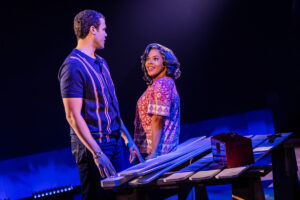
The Washington Senators, Joe’s beloved team, no longer existed in the new century. So he’s now rooting for the win-challenged Baltimore Orioles. References to Willie Mays and other period ballplayers had to be changed. Steroids, not a hot-button issue mid-century, becomes a convenient way to discredit Joe. And that “goulash” Meg sings about is gone along with the idea that culinary skills are the way to a husband’s heart.
Not only is Meg now a schoolteacher, but one of the couples in the opener “Six Months Out of Every Year” is a fanatical female fan with a baby-holding husband who can’t get her attention during the game. And while Joe still refers to meg in song as “old girl,” that only comes after she calls him “old guy” – a small but very smart change that allows the song “Goodbye, Old Girl” to land without any sense of condescension.
Another series of changes are sparked by the “what if” casting of both Meg and Joe with Black actors. Not an example of color-blind casting, the choice is color conscious with the book upping Joe’s motivation by making his late father a former Negro League player who never got a shot at the majors. Thus, Joe’s not just opting into the bargain for himself: He’s also fueled by legacy injustice.
As Joe’s older self, Quentin Earl Darlington captures both the sports obsession and the love for his wife. Bryonha Marie Parham makes Meg’s every appearance a pleasure. And Jordan Donica (recently on Broadway in My Fair Lady and Camelot revivals) understands that there needs to be a humble sense of wonder in the suddenly youthful Joe Hardy.
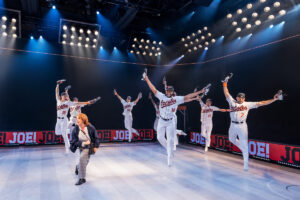
There are some downsides to the updating. By making Meg so well-rounded, Joe’s decision to up and leave is hard to forgive. The heavy lyric rewrite of “The Game” to make the team seem less sexually obsessed drains the focus and fun out of the number. And the difference in the 2000 media world makes the press’ inability to nail Joe on his false biography even more difficult to buy. These issues, however, are dings and not debilitating (For an example of the latter, see the woeful updating of “Tootsie” from film to Broadway musical.)
If this version of Damn Yankees is to move on, perhaps some additional tweaking would help the otherworldly roles. When it comes to song and dance, Rob McClure as the devil Applegate and Ana Villanfañe as his accomplice, Lola, are in top form. Neither role, though, pops as much as Joe(s) and Meg. It’s difficult these days to make a slickly suited villain funny – especially when he comes across as more pimp than prince of darkness. And more pleasure should come from watching him desperately trying to salvage his plan.
And while I’m not saying Vallanfañe should emulate Gwen Verdon, I left wishing I had seen more playfulness to supplement Lola’s sinfulness and sincerity. I also wanted to ache a bit more for her since she’s the character who experiences the most dramatic transition. After centuries of serving the dark side – she boasts early on in song about the death and destruction she has left in her path – she softens when failing to flip Joe. It’s her sacrificial actions that spark Joe’s salvation but that gets a bit lost here.
Then again, Damn Yankees, then and now, is one of those shows whose first act can put you in musical theater nirvana while its post-intermission act levels down to “very good.”
That being said, who would complain if a favorite baseball team delivered doubles and triples in later innings after slamming home run after home run early on?
This Damn Yankees certainly lands in the Win column.
Directed and choreographed by Sergio Trujillo, Damn Yankees (2 hours and 10 minutes with one intermission) continues on the Fichandler Stage, 1101 Sixth Street SW, Washington, D.C., now through November 9. Tickets are available in person Tues.– Sun. from 12 noon – 8 p.m. Eastern Time at the box office, by calling 202-488-3300 or clicking here.

